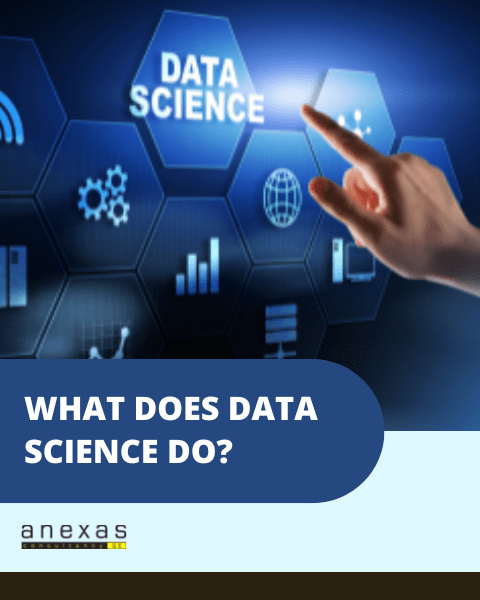What does Data science do?
What does data science do on a daily basis? Data science, in simple terms, is drawing useful insights from structured or unstructured raw data. The objective of this article is to provide you with the knowledge you require to understand the benefits of data science, its implementation in several businesses, jobs available for data scientists and courses available to become one.
What is data science?
Data science is the process to draw information from raw data and interpret it into useful insights for business decisions. Different businesses use data science every day to develop new patterns related to their business which help the company grow.
Anexas offers a Data Science course for Beginners, a 55 hours course dedicated to training newcomers and non-programmers in data Science disciplines and principles.
Data science involves a life cycle of capturing, maintaining, processing, analyzing and then communicating. To elaborate on this lifecycle; First raw data is captured from different sources, it is then converted into a useful form, then processing which involves data mining, data modeling, data classification and summarization to find patterns and ranges for analysis, then performing different analyses using several methods and lastly communicating the analyses incomprehensible forms.


What are the benefits of data science?
Data science binds IT and management together. By structuring data through predictive analyses, Data science has made business decisions more definite, calculative and customer oriented. There are various benefits of data science few of which are listed below:
- Data science is flexible in terms of demand, it is used in major sectors like healthcare, e-commerce, finance, corporate and more, making it one of the eminent jobs.
- Data science helps businesses to make better decisions.
- It lowers business risks with data-driven evidence that helps in calculative actions.
- Data science helps in sales and marketing by providing solutions based on customer experiences and expectations.
- It works on the current work system to analyze the system for improvements.
- The job also includes developing patterns and algorithms to develop the management and products.
- Data science uses machine learning and Artificial intelligence which helps in developing security and automation.
Eligibility, Job opportunities and salary benefits of data science
We have discussed the basics of data science and how it is beneficial for businesses. Let us now discuss how it is beneficial for an individual, what are the opportunities available and how it is an advantageous career.
Eligibility for learning data science courses
Data science requires knowledge of mathematics and statistics, computer science is an added advantage. For undergraduate students, it requires more than 50% marks in mathematics, statistics or computer science in 12th examination.
For graduates, it requires a bachelor’s degree in science, engineering, technology or mathematics. Graduates in business studies like BBA or MBA, are also eligible for suitable data science courses
To sum up, any professional belonging to IT, marketing, engineering or software can take a data science program or course to pursue a career in the field of data science.
Job opportunities after completion of a data science course
Data science is a vast field with many job opportunities and are the fastest growing job on Linkedin, which is expected to create 11.6 million jobs by 2026. In comparison to IT fields, data science has a high demand for professionals as there is less availability in the sectors. According to an article published in naukri.com, 3,00,000 plus data scientists would be required in different sectors by 2024, with 3400 positions increasing every month. These sectors include healthcare, banking, finance, media and entertainment, retail, telecommunications, automobile and others.
Salary benefits after data science
According to U.S. news, in the USA Data scientists made an average of $98,230 in 2020. The highly paid 25% made $130,370 and the less paid 25% made $71,790 in that year. As per PayScale, the average salary for data scientists in India is Rs. 812,954. The top companies paying higher salaries in India are Amazon, Flipkart, Walmart, Hewlett Packard Enterprise, IBM, Deloitte Accenture and [24]7.ai.
Curriculum of data science?
The curriculum of data science depends on the experience of an individual. It is divided into three parts based on the experience level or knowledge of an individual. These are; basic, intermediate and advanced courses in data science with relevant certifications.
Courses coverage of data science with Anexas
Data science- basic course
In this course, you learn the basics of data science and different aspects of it. You learn to prepare data for analysis, basic visualisation and modelling with exercises and real-time projects. The course content are:
- Python
- Numpy
- Pandas
- Scipy
- Probability
- Statistics
- Data pre-processing
- Data visualisation
- Linear regression
- Multiple linear regression
- Non-linear regression
- Clustering
- Association rule mining
Data science- intermediate course
In this course, after the basic knowledge you learn the next level of data science and therefore you learn SQL, NLP and different statistical NLP techniques. The course content are:
- Classification
- Feature engineering
- Ensemble methods
- Database
- Introduction to Statistical NLP techniques
- NLP-NLU delivery
Data science- advanced course.
In this course, after the basic and intermediate knowledge you learn the expert level with Neural Networks using TensorFlow and Keras, CNN and different parts of it in detail. The course content are:
- Neutral networking using TensorFlow and Keras
- Working with images and CNN building blocks
- CNN Architecture and Transfer Learning
- CNN’s at Work- Semantic Segmentation
- Object detection
- CNN’s at work- A siamese network for metric learning.
Links for course pages
Data Science – Basic Course
Data Science – Intermediate Course
Data Science – Advanced Course
Pre requisites
How to get Data science and AI Engineering certificates?
Complete any of the three courses based on your knowledge and experience, on the completion of the course receive a hard copy and soft copy of your certificate from Anexas Europe with international recognition. To start with this process, you first need to enrol with Anexas courses, complete the training, appear in the Data Science exam and then you can receive your certificate.
Validity of Data science and AI engineering certificates?
Data Science certificate with Anexas is valid for lifetime. Anexas follows the latest syllabus, which is updated with the requirements of various industries. With lifetime access to your dashboard with study material, you stay connected with the new developments in the fields of Data Science.
Conclusion
The foundation of data science is extraction of useful insights from raw data. It includes capturing raw data, storing it in different formats, processing for analysis, analysing for its usefulness and then communicating through graphs, charts and other readable forms.
Data science is one of the fastest-growing industries with major sectors requiring the need of data scientists to upscale their value, decision-making, management, customer service and much more. These sectors include healthcare, banking, finance, logistics, security, automobile and other sectors.
With more demand in the future and fewer individuals available, the industry is offering high salaries and more job opportunities which can help take your career up a notch. Any science graduate, undergraduate or business graduate can take the course and get the relevant certification in the industry to kick start their career in data science.
FAQs
What does data science do on a daily basis?
Data scientists engage in various activities on a daily basis, including data collection, cleaning, and preprocessing, conducting exploratory data analysis, building and training machine learning models, evaluating model performance, and communicating insights to stakeholders. They utilize programming languages, statistical techniques, and analytical tools to extract valuable insights from data and solve complex problems.
what does a data scientist do on a daily basis?
A data scientist’s daily tasks typically involve activities such as data collection, cleaning, and preprocessing, conducting exploratory data analysis, building and training machine learning models, evaluating model performance, and communicating insights to stakeholders. They utilize programming languages, statistical techniques, and analytical tools to extract valuable insights from data and solve complex problems.
What does data science do for beginners?
Data science for Beginners course offers a pathway to learn fundamental skills in data manipulation, analysis, and visualization. It introduces programming languages like Python or R, statistical methodologies, and machine learning algorithms. With these skills, beginners can start solving real-world problems and making data-driven decisions.
Which degree is best for data scientist?
A degree in a field related to data science, such as computer science, statistics, mathematics, or data analytics, is generally considered best for aspiring data scientists. These degrees provide a strong foundation in programming, mathematical modeling, statistical analysis, and data manipulation, which are essential skills for a data scientist.
How is Artificial intelligence different from data science?
Data Science is a multidisciplinary process that involves processing, analysis, visualization and prediction. Artificial Intelligence is an implementation of the predictive model with autonomy.
Where is data science used?
Data science is used where study of data is required to draw important business decisions. Data Science is used by all major industries like marketing, finance, healthcare, human resources and also government programs.
What do data scientists do?
Data Scientists use raw data and draw insights from data to help organisations solve business problems. It involves computer science, maths, statistics, analysis and also business sense to be a data scientist.
What is the eligibility for a data science course?
Anyone with basic knowledge of maths, statistics and computer science is eligible for a Data Science Course. Undergraduate students from science and commerce streams, graduates, post graduates or Phds in science and business studies, and even professionals working in the fields of IT, engineering, software, marketing, and other science and business professions can join the course.
What is the eligibility for becoming a data scientist?
To become a Data Scientist, a strong background in mathematics, statistics and computer science is required. Undergraduates or postgraduates from relevant fields of study in Science and business studies are eligible. Experience with working on large data sets, machine learning and statistical modelling helps in the career while strong communication and visualisation skills are also required at different levels of a Data Scientist career.
Can data science be learnt by self study?
Learning Data Science on your own can lack structure, you can miss the latest syllabus, important elements and key concepts. You can learn data science with online courses which provide the latest curriculum required for industries and get you certified.
How to get the data science certification?
There are different certification courses available for Data Science online and offline. After completion of the course, certificates are issued.
What is Artificial intelligence and data science engineering?
Artificial intelligence is the implementation of human intelligence in machines, designed to think and mimic humans. It is a wide field of computer science and requires robust datasets. Data Engineering is the practice of collecting, storing and optimising large data sets. It requires work with big data to prepare data for operations and analysis.
Who should study Artificial Intelligence and Data science?
With every company introducing Data Science and Artificial Intelligence in their domain, the opportunities are vast. After 12th, students of any stream can pursue AI if they want to become a Machine Learning Engineer, Software Engineer, Hardware Engineer, Research Engineer and Business Intelligence Developer etc. Professionals who are already working as engineers, in IT, or in business fields can opt for Artificial Intelligence. Whereas any newcomer or professional from IT, engineering, marketing or software can opt for Data Science with keen interest to work with data, maths and statistics and with interest in working for different domains.
What will I study in this course?
Data science certification course includes course content like introduction of data science, programming languages Python or R, concepts like modelling, processing, visualisation, mining, statistics, clustering, linear regression, SQL, NLP-NLU delivery< neutral networks and CNN.
What are the career opportunities after the completion of a data science course?
After completing a course in data science, you have multiple career options like Data Scientist, Data Analyst, Data engineer, Data Architect, Statistician, Business Analyst, and other profiles. There are major domains which deal with data everyday like healthcare, human resources, telecommunication, security, manufacturing etc, with numerous job opportunities and higher salary benefits.
Related posts
Course overview
The course offers online interactive live classes, industry project guidance, industry worked out projects, course material, free ebooks, video sessions, study materials, with mock assignments to prepare for the Data scientist exam.
Duration
The course offers overall 45 hours of sessions till course completion. Two hour long weekend batches with project guidance and instant query clarification by the trainer. You can get the information of the latest batches on Anexas website.
Syllabus
The syllabus of the Data Science course includes training of the latest tools and softwares used like Python, Numpy,Pandas,Scipy etc, sessions on machine learning and artificial intelligence engineering. You can get the syllabus for Data Science on Anexas website.
Assignments
The assignments of Data Science course include coding assignments using industry tools like Linear regression, data mining, clustering, CNN at work etc. The individuals need to complete all the assignments to get the certifications.
Projects
The projects of the Data Science course include 25+ projects during the course. The projects are industry worked out from different industries like healthcare, social media, custom analytics, Fintech solutions, HR analytics etc.





